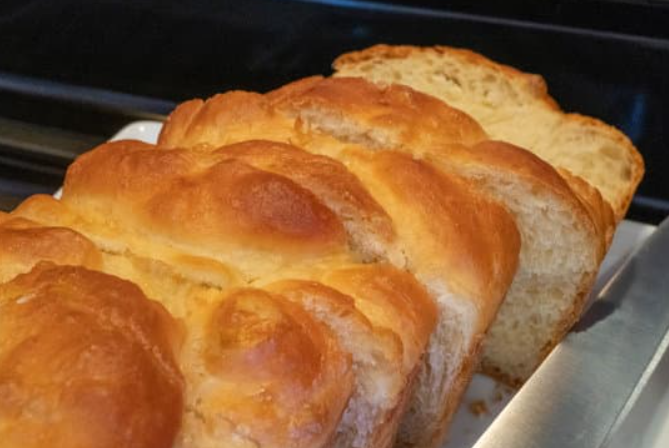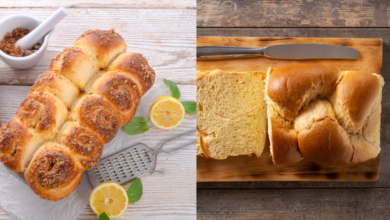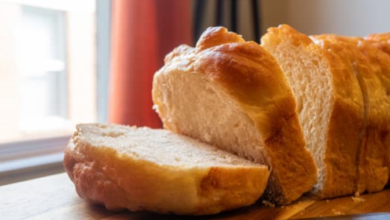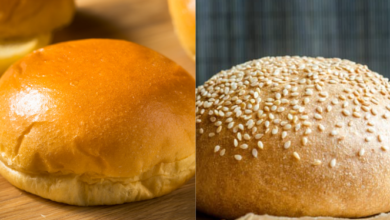Here’s The Answer To Whether Brioche Contains Sugar Or Not

What To Know
- While sugar is not a mandatory ingredient in brioche, it is commonly added to enhance the bread’s flavor and texture.
- Whether you prefer it with or without sugar, the key is to consume it in moderation as part of a healthy and balanced diet.
- Yes, natural sweeteners such as honey or maple syrup can be used in place of sugar to add sweetness and richness to brioche.
Brioche, a delectable bread with a rich history, has long been a staple in many cultures. Its golden-brown crust, soft and fluffy interior, and buttery flavor make it a beloved treat. However, one question that often arises is, “Does brioche have sugar?” This blog post delves into the ingredients and nutritional composition of brioche to provide a comprehensive answer to this query.
Ingredients of Brioche
Traditional brioche dough consists of a combination of flour, milk, eggs, butter, salt, and yeast. While sugar is not a mandatory ingredient in brioche, it is commonly added to enhance the bread’s flavor and texture. The amount of sugar used varies depending on the recipe and the desired level of sweetness.
Sugar Content of Brioche
The sugar content of brioche can vary widely based on the specific recipe. Some recipes may use a small amount of sugar, such as a few tablespoons, while others may incorporate more substantial amounts. According to the USDA FoodData Central, a typical serving of brioche (3.5 ounces or 100 grams) contains approximately 10 grams of sugar.
Impact of Sugar on Brioche
Adding sugar to brioche dough has several effects on the bread’s characteristics:
- Flavor: Sugar enhances the sweetness of brioche, making it a more indulgent treat.
- Texture: Sugar helps tenderize the bread, resulting in a softer and more fluffy interior.
- Crust: Sugar contributes to the formation of a golden-brown crust by caramelizing during baking.
- Yeast Activity: Sugar provides nourishment for yeast, aiding in the fermentation process and resulting in a more airy and flavorful bread.
Brioche Without Sugar
For those who prefer a less sweet brioche, it is possible to make it without adding any sugar. The resulting bread will have a more subtle flavor and a slightly denser texture. However, it will still retain the characteristic softness and buttery richness of traditional brioche.
Nutritional Value of Brioche
In addition to its sugar content, brioche also contains other essential nutrients, including:
- Carbohydrates: Brioche is a good source of carbohydrates, providing energy for the body.
- Protein: Eggs and milk contribute to the protein content of brioche, making it a more satiating food.
- Fat: Butter is the primary source of fat in brioche, providing richness and flavor.
- Fiber: Brioche contains a small amount of dietary fiber, which can aid in digestion.
When to Avoid Brioche
While brioche can be enjoyed as part of a balanced diet, individuals with certain health conditions may need to limit their intake. For example:
- Diabetes: Due to its sugar content, brioche may not be suitable for individuals with diabetes.
- Weight Management: Brioche is a calorie-dense food, so excessive consumption may hinder weight management efforts.
- Gluten Intolerance: Traditional brioche contains wheat flour, which is unsuitable for individuals with gluten intolerance or celiac disease.
Recommendations: The Sweet and Savory Balance
Brioche is a versatile bread that can be enjoyed in various ways. Whether you prefer it with or without sugar, the key is to consume it in moderation as part of a healthy and balanced diet. By understanding the ingredients and nutritional composition of brioche, you can make informed choices that align with your dietary needs and preferences.
Questions We Hear a Lot
1. What is the main difference between brioche with and without sugar?
The primary difference lies in the sweetness level. Brioche with sugar has a more pronounced sweetness, while sugar-free brioche offers a more subtle flavor profile.
2. Can I substitute honey or maple syrup for sugar in brioche?
Yes, natural sweeteners such as honey or maple syrup can be used in place of sugar to add sweetness and richness to brioche.
3. Is brioche a good choice for breakfast?
Brioche can be a satisfying breakfast option when paired with other nutrient-rich foods such as fruit, yogurt, or eggs.
4. How long can I store brioche?
Freshly baked brioche can be stored at room temperature for 2-3 days. For longer storage, it can be frozen for up to 2 months.
5. Can I make brioche at home?
Yes, brioche can be made at home with some patience and the right ingredients. However, it is a time-consuming process due to the multiple rising periods required.





